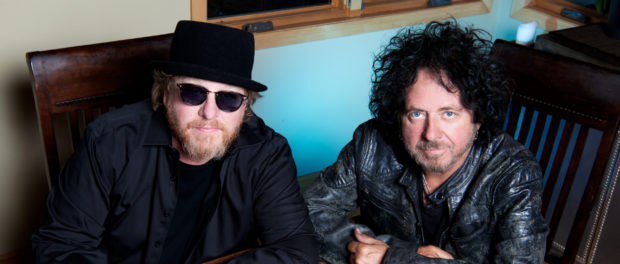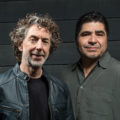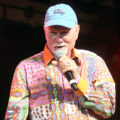Toto front man Joseph Williams unboxes simultaneous solo release with Steve Lukather
 Photos provided by Alex Solca
Photos provided by Alex Solca
Technically speaking, jazzy classic rockers Toto didn’t just step out of the studio, but with concurrent solo releases from lead singer Joseph Williams and guitarist/vocalist Steve Lukather (who appear on each other’s projects alongside prior members), it might as well be a double batch of band tunes.
After all, the pair continues to spearhead the latest line-up, now four-plus decades into album sales exceeding 40 million and streams reaching over a billion thanks to the ubiquitous “Hold The Line,” “Rosanna,” “I Won’t Hold You Back,” “I’ll Be Over You,” “Pamela,” “Stop Loving You” and “Africa” (which Weezer recently took right back to number one).
As session players beyond the group, the guys’ collective fingerprints appear on a mindboggling 5,000 albums that cumulatively moved more than a half-billion copies, ranging from Michael Jackson’s “Thriller” for Lukather (also a member of Ringo Starr’s All Starr Band) and “The Lion King” for Williams (who followed in the footsteps of his composer father John Williams and actress/singer mother Barbara Ruick).
Despite such staggering statistics, the delightfully down-to-earth Williams gladly fielded all of Chicago Concert Reviews’ questions prior to a May 2, 2022 performance supporting Journey at the Allstate Arena, starting with his standalone release, “Denizen Tenant,” two turns fronting Toto and some spectacular advice from a certain “Star Wars” scoring superstar.
 What made these solo projects as opposed to landing within the band?
What made these solo projects as opposed to landing within the band?
Joseph Williams: After the last show we did in 2019, we knew that the band was gonna take a break because a couple people didn’t want to tour anymore and/or just can’t for whatever reasons. So we knew pre-pandemic that 2020 was gonna be off, at the very least, and that whenever when we came back out on tour, whatever that would look like, we would actually talk about that a year later, like around the end of 2020. Luke had already planned to do a record at the beginning of 2020. I had already been working on mine a little bit since 2016 and planned to write most of the songs, and really produce it and finish it in 2020, so they were very separate all along. It was only after the fact, after Luke introduced me to his label, [The Players Club / Mascot Label Group], that we decided to put them together. We figure because we can’t tour, this could also serve as material for Toto fans to put ‘em together. At least you can get a sense of some new music from the guys in the band.
Luke’s album, [“I Found The Sun Again”], was completely designed by him. He wanted to go into a studio with different musicians. It was an entirely different band than Toto, although [Toto’s co-founding keyboardist/songwriter] David [Paich] was in that band, in terms of the musicians, and I helped with vocals and some songwriting. But other than that, his plan was to just record an album the way we used to: do a couple of takes, “that’s the one,” you move on. My album was always meant to be produced out and done the way we usually do Toto records. It just ended up complementing each other in that way…
What exactly does “Denizen Tenant” mean?
Williams: Pieces of the song came to me from Steve Overton, this incredible musician/guitar player/bass player, who lives in New Mexico. I met him through a neighbor of mine, who’s his brother actually, and Steve has this incredible sense of humor. He’s incredibly smart and witty, and he writes these incredibly strange tunes with very acerbic lyrics. He had that lyric and the basic melody of what you hear in the song. I made a chorus and a bridge, and ended up using that as the title cause I loved it so much.
The context of his original lyric is about a bad breakup with a girlfriend/roommate situation, but it’s his weird, twisted, witty way of talking about it. It’s like somebody who over stayed their welcome. “Denizen” and “tenant” mean the same thing, so a “Denizen Tenant” is like the guy who’s still at your party at 4 a.m. and you’ve gotta tell him to go home. The reason I liked it and wanted to use it was because in my younger days, I was the “Denizen Tenant” of Toto. The guys always used to have to tell me to go home [laughs], so I just thought it was funny.
 Besides the many originals, what led you to covering The Beatles and Peter Gabriel?
Besides the many originals, what led you to covering The Beatles and Peter Gabriel?
Williams: To be perfectly honest with you, it was accidental. I was working on one of the other songs and I took a break. In my set up, I have a keyboard in front of one monitor and I can turn to another one. I was looking at YouTube and you know how their algorithms show you something that you kind of want to see? Peter Gabriel’s [“Don’t Give Up”] came up. I clicked it, watched it, and it reminded me how much I loved the song, the video and Kate Bush’s performance. I literally turned over to my left, [started] playing the changes on my keyboard and singing it into the mic [wondering] what it would sound like with me doing it. I hit “record,” and literally four or five hours later, I had the basics of the track. The same is true with The Beatles’ tune [“If I Fell”]. That’s exactly how that happened!
What are a few moments you feel will be the most unexpected to fans?
Williams: I think “Denizen Tenant” is gonna be a curve ball for people. I went nuts on that track and just had so much fun with the vocal arrangements and everything. The other one is a song called “No Lessons,” which is a [Chicago/Amy Grant songwriter] Jay Gruska tune that he produced for me, the ballad on this record. He and his wife wrote it about me, for me, cause they’ve known me my whole life and it just felt so natural to sing. Jay knows me so well, he nailed it. To me it’s different. I think people might be surprised by that, and I hope, pleasantly.
Are there any you feel lean closer to the Toto lane?
Williams: Well, there are a few that are more deliberately leaning towards Toto, like “Liberty Man.” That was deliberate cause I wrote it with Paich, I asked [ex-Toto and The Who drummer] Simon [Phillips] to play on it and [former Toto/Phil Collins bassist Leland Sklar]. I just wanted to have a good Joe/Dave Toto song on the album, so that was intentional. Then the other aspect of Toto-ness is just the bigness of the production. That’s one thing I’ve always been a fan of theirs back in the day before I was even a member. I like that big sound where you gotta listen to the record a couple times to get it all. I also like albums that have different kinds of grooves on them, not just 4/4 all the time. Toto was all about that, so that’s why I feel like I guess I belonged in the group.
How did your start with the band turn out?
Williams: I had a short, successful run with them in the latter ‘80s, especially in the Europe and Asian markets. The two albums that I did with them, [1986’s “Fahrenheit” and 1988’s “The Seventh One”], were sort of a beginning of a comeback after the “Toto IV” success. I shouldn’t say that cause “Isolation” was just as huge and such a great album. [The albums I was involved in] didn’t really latch on here on in the States the way “Toto IV” did, but overseas they did.
 And unfortunately I just lost my voice. It’s just as simple as that. The guys just had to move on. These were virtuoso musicians that couldn’t have somebody who couldn’t do the job live. There was just no time to figure out how to get me well enough and they had been through it two times already with two other singers, [Bobby Kimball and Fergie Frederiksen]. That was why it was short-lived. My time with them was short but potent…I’m very proud of “Pamela,” “Till The End,” “A Thousand Years,” all that early Toto stuff I did and every song I’ve written with Dave. Both he and Jay Gruska have been incredible mentors.
And unfortunately I just lost my voice. It’s just as simple as that. The guys just had to move on. These were virtuoso musicians that couldn’t have somebody who couldn’t do the job live. There was just no time to figure out how to get me well enough and they had been through it two times already with two other singers, [Bobby Kimball and Fergie Frederiksen]. That was why it was short-lived. My time with them was short but potent…I’m very proud of “Pamela,” “Till The End,” “A Thousand Years,” all that early Toto stuff I did and every song I’ve written with Dave. Both he and Jay Gruska have been incredible mentors.
What was different after your voice came back and you rejoined?
Williams: It was very different. I was very different. I had a long career in television as a composer, while I got married, was raising kids and had a house out in Santa Rosa valley with horses. I had a completely different career, but remained friends with all of the guys during all that period of time. I was just a different person, so by the time I came back in 2010, I was more serious. I went and got a new vocal teacher, and re-learned how to do the job again. It was also different [than] the last versions that Luke had been doing previous to that, because this time, Paich and [fellow co-founding keyboardist] Steve Porcaro were back. The reason we were doing it was to benefit [late bassist] Mike Porcaro. He was dying of ALS [Amyotrophic lateral sclerosis] and didn’t have much means of support.
In your opinion, what factors accounted for Toto’s resurgence as of late?
Williams: The number one factor is the song “Africa,” the covers from different bands [across several genres and] the Weezer cover. I’m partial to the original myself, but listen, it’s great. It did a tremendous thing for us. It’s fabulous…The number two reason was that while that was happening, we were touring a lot. The audiences just started to grow because the awareness of “Africa” started to grow all over again. The equation is actually pretty simple, but we’re obviously incredibly grateful.
You guys are also known as kings of the session men. Do you have a favorite?
Williams: Probably the most famous session that I’ve done was “The Lion King.” I worked on the original movie with [composer] Hans Zimmer and all the Disney people. Before that, I worked on the demos for the whole movie with [Michael Jackson collaborator] Siedah Garrett. I went into the studio and sang a bunch of those Elton John and Tim Rice songs to see how they were developing, so that was pretty stellar. I felt pretty honored to be able to do that one.
How cool were you in the eyes of childhood friends with you dad scoring such mega movies?
 Williams: When I was a kid, that hadn’t really happened yet. When I was an early teen, he had done some of the disaster films that were out, like “Towering Inferno” and “The Poseidon Adventure,” but it wasn’t until I was almost 20 that he hit with “Star Wars,” Steven Spielberg [“Indiana Jones,” “E.T.”] and all of those guys, so I wasn’t a real little kid. By the time he really hit, I was already hanging out and making music with my own friends. We weren’t even really paying attention and my friends weren’t really impressed with what my dad was doing, you know what I mean?
Williams: When I was a kid, that hadn’t really happened yet. When I was an early teen, he had done some of the disaster films that were out, like “Towering Inferno” and “The Poseidon Adventure,” but it wasn’t until I was almost 20 that he hit with “Star Wars,” Steven Spielberg [“Indiana Jones,” “E.T.”] and all of those guys, so I wasn’t a real little kid. By the time he really hit, I was already hanging out and making music with my own friends. We weren’t even really paying attention and my friends weren’t really impressed with what my dad was doing, you know what I mean?
What was the best artistic advice he gave you?
Williams: The best artistic advice is also the best advice he ever gave me, which is to get up every single day and do a little bit of work, in terms of writing or creating, in some way, shape or form no matter what. Even if it’s just four bars of music, every single day, rain or shine, whether you want to or not, whether you have other appointments or not, find time and do it, just like you’re going to the gym. Do it like it’s a muscle that you have to work out. It took me a long time to get that message, but I do that now with my voice, whether I’m on the road or not, and I do it whether [or not] I’m working on a video or music.
You also pay tribute to your mother on the album. Tell us a bit about that tune.
Williams: My mother died when I was 13-years-old, which was completely tragic for our whole family. My siblings were a couple of years older. It was a horrible period of time, obviously. When I started making solo records, I started with a song about those feelings, and then the next one, I had like a dedication to her. The next one had a little song/poem and so on. There’s always been something in my work for her, which is also, quite frankly, a means of working out the feelings about her dying. All that takes time to work out. The song, “Wilma Fingadoux,” is that thing on this new album. It’s certainly the most fleshed out of all those poems and dedications over the years, for sure.
They know about my dad, but what they don’t know about me very much is that my mother was a singer, a stage performer and an actress. In the video, you can see some images of her when she was young and she was doing some acting. She was very open, boisterous, had this great sense of humor and was always singing in our house. That was how I got started with what I wanted to do with my life.
The title of the song is actually a punch line to a joke she used to tell, cause she had this wicked sense of humor. The joke is that it’s a play on words. “If my dick don’t work, will my finger do?” That was one of hers [laughs]. My father told me that and I thought that was so funny. I decided to use that as the title and spell it like the name of French spinster. That was her sense of humor, so that’s what that’s about…Both my daughters are singing on it. My one daughter, Hannah, who is also on the Peter Gabriel song, is in the video. She’s not only a wonderful singer, but she looks a lot like my mom, so the point there is to just show that similarity in the generations.
 What prompted you to get involved in making music videos for all these new songs?
What prompted you to get involved in making music videos for all these new songs?
Williams: It started by doing the cockamamie
lockdown “Africa” video back last year with an iPhone…Then I’ve been making my own videos for the songs, just because there’s no money from anybody to do anything major. I’m getting a little better at the editing and having a lot of fun doing it in between doing music stuff. It provides a little bit of content so somebody can look at something while listening to the song online.
What do you recall about Toto’s glossier video days?
Williams: I had a ball back in those days. First of all, there was a bigger record company for Toto and more money. The internet didn’t really exist, so you had to film your videos just like you were making a movie. Then they had to be produced and broadcast on MTV. It was a completely different animal the way it was done. It was a production, like a frickin movie set, which is still the case nowadays if you have the budget to do it, but most people don’t if you’re not Justin Bieber or whatever. We didn’t have massive budgets, but we still had sets and that kind of stuff. We hired girl dancers and we had Paula Abdul in a video with me, so in that sense, it was so different. I’m so incredibly grateful for being alive and working in that time…
Did any shows around Chicago from then or now stay etched in your mind?
Williams: Not necessarily any particular shows, but many stays in Chicago have stuck out in my mind. I remember many extremely glorious days off there. I remember one in particular when I took a drone out and flew it into the side of a building [laughs], just stupid stuff like that, but I love Chicago. It’s one of my favorite places to walk down by the water. I have a great time there.
What are everyone’s intended touring plans?
Williams: We miss it, like you can imagine. Being able to play is our lifeblood. It’s hard, but we also know it’s difficult for everybody not being able to see any concerts…God willing, everything will hopefully, slowly, obviously get back to some kind of normal and we can have concerts again. It would be horrible if that whole business were gone. The plan is to do that and to incorporate some of the songs from both of these records as the new material that we would normally do in our show from a new Toto album. In terms of what songs we’ll do or how many, I have no idea until we actual start getting into a real rehearsal. You can see the basis of the show in the November livestream we did where we introduced the new band members, but we have probably about another 45 minutes of music to add, which will include songs from these new records. And then beyond that, in terms of going out and performing any of it solo, we’ll just have to wait and see…
For additional information on Joseph Williams and Toto, visit JoesWill.com and TotoOfficial.com.








